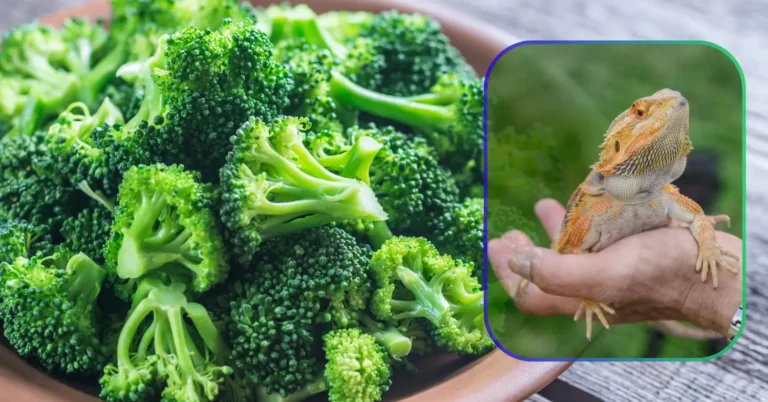Can bearded dragons eat broccoli? Broccoli is a delicious vegetable that can be served in many different ways, but it’s not always safe for your bearded dragon. Broccoli is classified as a cruciferous vegetable, which means it contains sulfur compounds that are toxic to humans and animals alike. While this may seem like a good reason to avoid serving broccoli to your pet, there are some exceptions!
Another Interesting Read: Can Bearded Dragons Eat Watermelon (Owners Guide)
Vegetables hold significance in your bearded dragon’s diet, yet the choice of vegetables plays a crucial role. Certain vegetables, if not chosen wisely, may have adverse effects. Some vegetables, while safe occasionally, shouldn’t be a regular part of their diet. You might be pondering about broccoli and its place in this spectrum—can bearded dragons consume broccoli?
This nutrient-packed vegetable indeed provides essential elements for the growth and well-being of beardies. However, it comes with a caveat. Broccoli contains an acid and mineral in excessive amounts that can be harmful to bearded dragons. Hence, while they can have broccoli, it should not become a staple in their diet; moderation is key.
Nutritional Value of Broccoli
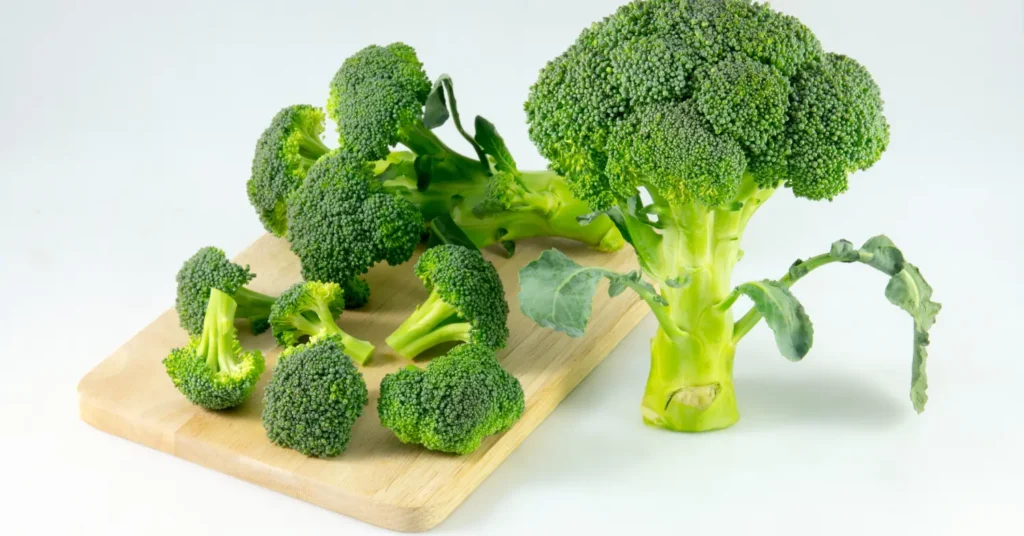
Broccoli, often hailed as a nutritional powerhouse for humans, contains a wealth of vitamins and minerals that are beneficial for bearded dragons too. Vitamins A and C support the immune system, vision, reproduction, and growth. Vitamin K1 plays a crucial role in blood clotting and bone health. Essential minerals like potassium aid in regulating blood pressure, muscle function, and kidney health.
Broccoli, known for its vibrant green color and distinctive shape, offers a variety of nutrients that can contribute positively to your bearded dragon’s diet. A 100-gram serving of raw broccoli contains:
While broccoli offers several valuable vitamins and nutrients, it’s important to note that bearded dragons require a specific calcium to phosphorus ratio. Raw broccoli has a higher phosphorus content compared to calcium, which can impact your pet’s health if not balanced appropriately.
A phosphorus-calcium imbalance can lead to serious issues, including metabolic bone disease (MBD). MBD can cause limb deformities, paralysis, and even be fatal if not addressed promptly. To prevent this, ensure your bearded dragon’s diet includes foods with a phosphorus-calcium ratio that favors calcium.
Another concern when feeding broccoli to your bearded dragon is its oxalic acid content. Oxalic acid binds with calcium, hindering its absorption and potentially leading to MBD. Additionally, oxalic acid can contribute to the formation of kidney stones, causing discomfort and health complications. To safeguard your dragon’s well-being, it’s advisable to limit their intake of oxalate-rich foods.
Broccoli Leaves, Stems, and Sprouts
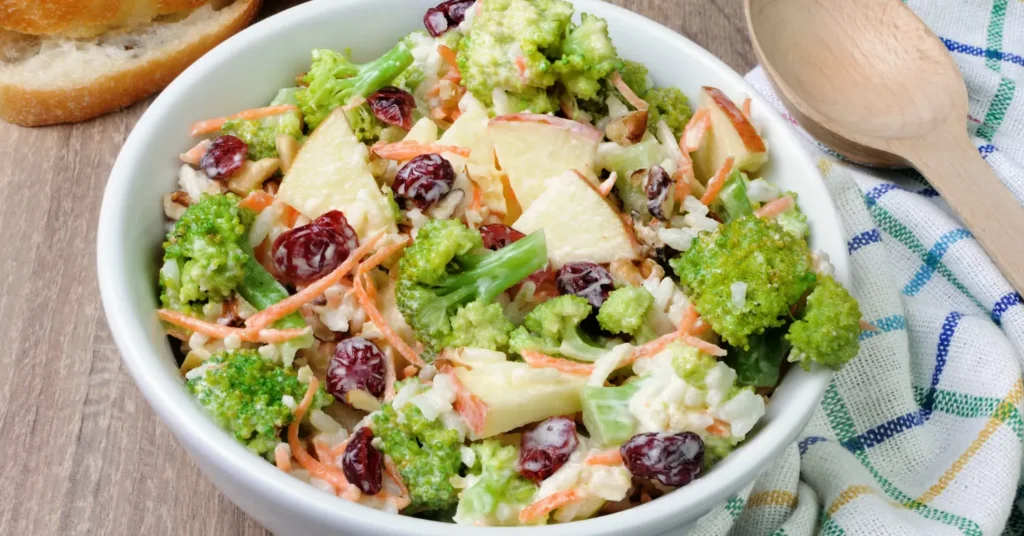
Bearded dragons can consume broccoli leaves, stems, and florets, but each part requires specific considerations:
Broccoli Leaves: Shred the leaves for easy consumption, as with other plants in the cabbage family. Offer them in moderation to avoid overloading your pet with goitrogenic substances.
Broccoli Stems: Shred the stems into small pieces, similar to florets. Limit the amount of stem to the size of one small broccoli floret.
Broccoli Sprouts: Avoid feeding your bearded dragon broccoli sprouts. These contain higher levels of goitrogens and oxalic acid, which can be harmful.
Can Baby Bearded Dragons Eat Broccoli?
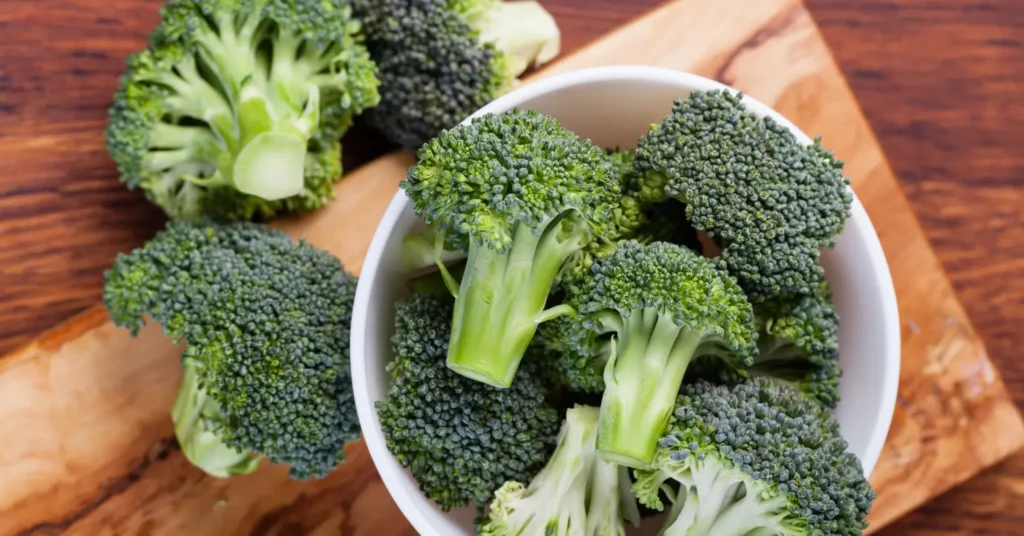
When it comes to the dietary needs of baby bearded dragons, a crucial factor is the balance between insects and plants. For optimal growth and development, they should consume 80% insects and 20% plants, a ratio that inversely applies to adult dragons. This implies limited space in their diet for non-essential vegetables.
Broccoli falls into the category of vegetables that aren’t nutritionally indispensable for your baby beardie’s well-being and growth. Despite any potential health benefits, the risks of harm outweigh the advantages, especially for a young dragon with developing bones. Moreover, broccoli’s resilient nature poses a potential choking hazard for your little beardie.
Opting for staple veggies over those suitable only for juvenile and adult dragons, is the wisest approach in nourishing your baby bearded dragon. This ensures a diet tailored to their specific needs and minimizes potential risks associated with unsuitable vegetables.
Serving Broccoli Safely
If you decide to offer broccoli to your bearded dragon, it’s crucial to prepare and serve it safely. To avoid choking hazards, cut the broccoli florets into small, manageable pieces. Be sure to wash the broccoli thoroughly, especially if it’s not organic, and remove any frozen pieces. Only offer the green flowery part of the florets, as the stem and stalk are challenging for your dragon to chew.
Pro Tip: Opt for Raw Broccoli
While you might be tempted to cook the broccoli, it’s best to feed it raw to your bearded dragon. Cooking can diminish the nutrient content, and offering raw vegetables aligns with their natural diet in the wild.
Believe it or not, there are merits to allowing your bearded dragon a taste of broccoli, despite the caveats. This veggie powerhouse packs a punch of vitamins and minerals crucial for your dragon’s well-being, including:
Potassium: A mineral that regulates blood pressure, prevents kidney issues, and supports muscular function.
Fiber: Essential for maintaining a healthy gut in your bearded dragon.
Manganese: A metabolic booster that combats inflammation.
Vitamins A and C: Strengthening the immune system, keeping your dragon robust.
Vitamin K: A key player in promoting bone health.
In moderation, broccoli’s rewards are ripe for the picking. But don’t rush to the feeding dish just yet—there’s more to the story.
Cons of Broccoli
While the nutrients might beckon, broccoli brings its baggage. Bearded dragons partaking in broccoli beyond moderation might face consequences. The calcium-to-phosphorus ratio in broccoli leans unfavorably, jeopardizing your dragon’s calcium absorption. This depletion can lead to a condition known as metabolic bone disease, twisting and paralyzing their limbs—a path you’d rather avoid.
Enter oxalic acid, another adversary within broccoli. This compound interferes with calcium absorption, potentially paving the way for kidney stones in your beloved bearded dragon.
How Much/Often Can Bearded Dragons Have Broccoli?
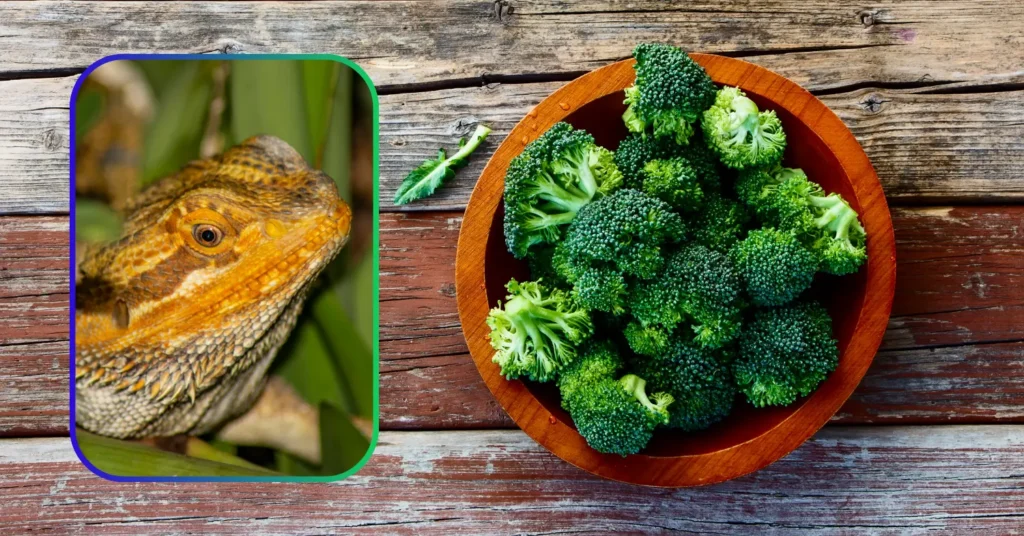
Eager to introduce a broccoli bite? Exercise caution. While the occasional floret won’t tip the scales, don’t get carried away. A tiny floret, served once a month, fits the bill. This measured approach offers a nutrient boost without overwhelming your dragon’s phosphorus intake.
It’s a common belief that bearded dragons can enjoy a bit of broccoli in their diet, and while this vegetable does offer health benefits, there’s more to the story. Here’s a breakdown of the pros and cons of feeding broccoli to your bearded dragon.
In moderation, broccoli provides essential vitamins and minerals for both humans and bearded dragons:
Considerations: Unfortunately, the nutritional balance in broccoli may pose risks.
While broccoli can offer health benefits, it’s crucial to understand the potential risks associated with its consumption by bearded dragons. Maintaining a balanced diet, monitoring the phosphorus-calcium ratio, and considering the impact of oxalic acid are essential steps in ensuring the well-being of your beloved dragon. Be a responsible Dragon Keeper and prioritize your pet’s health over casual treats.
Beyond Broccoli: Veggies for Your Dragon
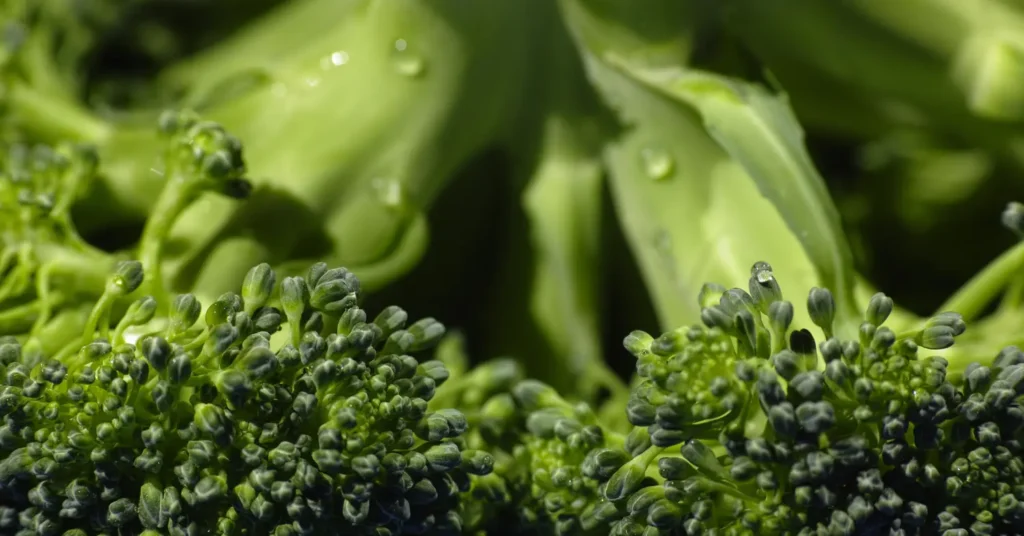
While broccoli has its merits, it’s wise to diversify your dragon’s diet. Consider these alternatives to balance their nutritional intake:
Certain fruits can offer valuable nutrients when included sensibly in a bearded dragon’s diet.
These fruits can be a tasty addition to their meals while ensuring they receive essential vitamins and minerals:
Fruits to Approach with Caution:
While some fruits can be a valuable addition to a bearded dragon’s diet, others should be approached with caution due to their high sugar content or improper calcium to phosphorus ratio. It’s best to avoid feeding the following fruits to your dragon:
Now that we have a foundation in place, let’s turn our attention to broccoli. Broccoli is a nutritious cruciferous vegetable enjoyed by humans for its health benefits. However, when it comes to bearded dragons, there are a few considerations to keep in mind.
Summary | Can Bearded Dragons Eat Broccoli?
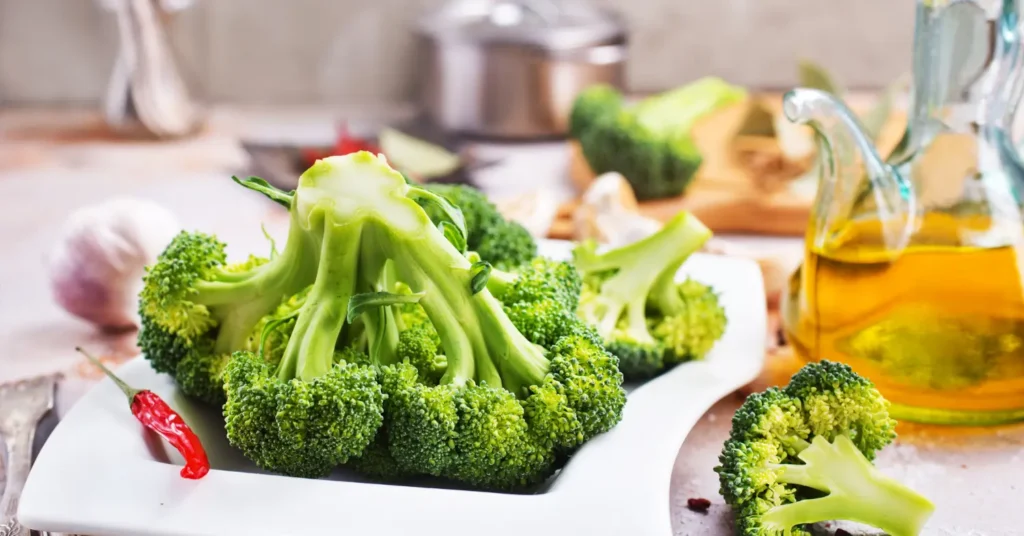
Owning a bearded dragon can be a delightful experience, especially for those new to lizard companionship. These creatures are generally easy to care for, particularly when it comes to their dietary needs, as they have a wide array of food options within their respective groups.
The common perception of broccoli as a nemesis for picky eaters raises a question: does the same principle apply to bearded dragons? In technical terms, broccoli is safe for these reptiles to consume, but with a crucial caveat—it should only be part of their diet in minimal portions. Broccoli contains compounds that, when ingested in large doses, can pose harm to your beardie.
Despite the risks, there are some nutritional benefits to feeding broccoli to your bearded dragon. The vegetable contains essential vitamins and minerals necessary for their well-being. Broccoli’s low sugar content and absence of oxalates make it a desirable addition to their diet.
Cons of Bearded Dragons Eating Broccoli
However, the cons cannot be ignored. Broccoli’s calcium-to-phosphorus ratio is not ideal for a bearded dragon’s diet, potentially leading to long-term health issues. Additionally, the vegetable is rich in goitrogens, which can disrupt thyroid hormone production, causing complications like goiter.
While broccoli can be offered as a rare treat, moderation is crucial. An occasional small floret once a week is a prudent approach. This ensures a nutrient boost without exposing your pet to an excessive amount of goitrogens.
Proper Preparation Matters
If you decide to introduce broccoli to your bearded dragon’s diet, proper preparation is essential. Fresh, raw broccoli is preferable, ensuring it’s free from any spoiled or rotten parts. Thoroughly wash the vegetable to remove unnecessary compounds, and soak it in cold water before serving to eliminate dirt and insects. Cut the leaves and florets into smaller, manageable pieces, excluding the stem from their diet.
Alternatives to Broccoli
Given the limitations on broccoli consumption, consider incorporating other vegetables into your bearded dragon’s diet. Cabbage, bell peppers, peeled cucumbers, squash, pumpkin, shredded carrots, sweet potatoes, and butternut squash are safe alternatives.
While broccoli can be part of a bearded dragon’s diet, it’s crucial to offer it in moderation. The potential risks associated with goitrogens and an imbalanced calcium-to-phosphorus ratio emphasize the importance of a well-rounded approach to their nutrition. When in doubt, consulting your veterinarian for tailored dietary advice is always a wise decision.
